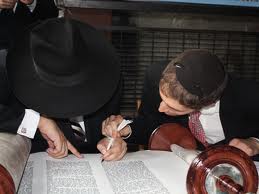*********************
VORTIFY YOURSELF
rebyosil@gmail.com
PARSHI’OT NETZAVIM/VAYELECH
Devarim (Deuteronomy) 29:9-31:30
Haftarah – Isaiah 61:10-63:9
130831
*********************
In the second Parsha of the two Parshi’ot read this week, Moshe Rabbeinu passes the mantle of leadership to his faithful disciple Yehoshu’a and Moshe steps aside and allows Yehoshu’a to guide Am Yisra’el. HaShem asks Moshe to summon Yehoshu’a to the entrance of the Ohel Mo’ed so that they might receive instruction together.
HaShem tells them that after Moshe passes away, Am Yisra’el will forsake the Torah and HaShem will conceal His Face from them, and great suffering will ensue.
The Torah therefore commands that Am Yisra’el should: “Kitvu Lachem Et Hashirah HaZot, V’Limdu Et B’nei Yisra’el, Simah B’Fihem, Liman Ti’hiyu Li Hashirah HaZot, L’Ayd BiB’nei Yisra’el – Write this song for yourselves, and teach it to the B’nei Yisra’el, place it in their mouths, so that this song shall be for Me a witness, against the B’nei Yisra’el” (Devarim 31:19).
HaShem requires every Jew to write a Sefer Torah (Kitvu Lachem Et Hashirah HaZot) in order to recall the covenant and the responsibility of that covenant with HaShem.
HaShem refers to the Torah as Shirah, literally ‘the song’. Song is perhaps a bad translation. In Hebrew, Shirah can mean song or poem. I believe that poem would be more accurate. This gives us great insight into what the Torah is and how we are to relate to it.
Rabbi Naftali Tzvi Yehudah Berlin, commonly known as the NeTZIV (1817-1893) presents a beautiful explanation of this thought. He writes that scripture is commonly viewed as prose and therefore taken literally. However, if we relate to the Torah as poetry, then the purpose of the Torah Sh’Ba’al Peh (the oral Torah), becomes clear – to illuminate and clarify the meaning
behind text.
For instance, when we read in the Torah that our matriarch Sara lived for “one hundred years and twenty years and seven years,” its unusual phrasing alludes to a deeper meaning. The Torah is sending us a message that at the age of one hundred, she was as sinless as a twenty year old. At twenty, she had the innocent beauty of a seven year old.
When we look at the Torah as prose, we often get bogged down in the validity and conflicting interpretations of Torah Sh’Ba’al Peh. But when we see it as poetry, Torah Sh’Ba’al Peh adds dimension and a wide spectrum of meaning to each and every word.
The verse that teaches us this is in itself a classic example of the opportunity to see deeper than just the words. The MaLBIM (acronym for Meir Leibush ben Yechi’el Michel, 1809-1879) asks why the Torah says “Liman Ti’hiyu Li L’Ayd BiB’nei Yisra’el (so that this song shall be for Me a witness, against the B’nei Yisra’el”). On first reading, one might understand from these words that when the B’nei Yisra’el stray from the Torah, the Torah itself will testify against them. As prose, this seems to be the meaning behind the words. But does HaShem need a witness to govern the universe?
The MaLBIM explains with a parable. A king frees one of his subjects who was imprisoned for theft and appoints him to guard his treasury. Since the king knew that by nature this man was prone to thievery, and it was safe to assume that he might steal again; the king chronicled the appointment in full detail.
The other citizens believed that the king did so to warn the former thief, that if he ever stole in the future, he would be put to death for stealing from the king is an act of treason. But actually, the king’s reason for writing it all down was to remind himself, that if this man was ever caught stealing, the king should be lenient with him, for he should have known better than to appoint him keeper of the treasury.
So, too, does HaShem record here: “So that this song shall be for Me a witness, against the B’nei Yisra’el“. The King of kings asks that this poetry be recorded, with all its nuances and all its meanings so that the King will always be aware of our shortcomings and act in a Merciful manner towards us.
Those who study the Torah as prose, view HaShem as a Vengeful G-d. Those who study the Torah as poetry; view HaShem as a Merciful G-d. At the approach of the Yamim Nora’im (the Days of Awe), when we beseech HaShem to be merciful with us, may we have the insight to see the poetry of His Torah.
Shabbat Shalom and may you be inscribed and sealed in the Book of Life.
Reb Yosil


